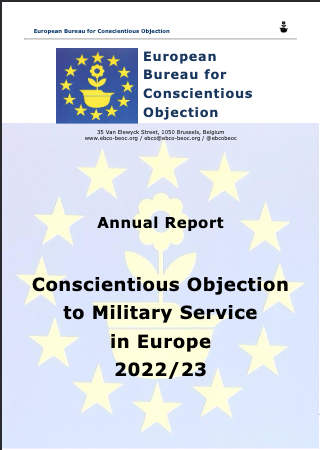Germany

|
|
Conscription: |
No |
General conscription was suspended as of July 1, 2011 by the 2011 Act Amending the Law on Military Service (BT-Drs 17/4821). It remains in the Constitution and it can be reintroduced at any time in the event of war (Article 12a of the Basic Law / Constitution). |
|
Conscientious objection: |
1949 |
First recognised in principle in 1949 in the “Grundgesetz” / Basic Law / Constitution of the Federal Republic of Germany: "No one may be forced to perform military service with weapons against his conscience." (Art.4 para.3 sentence 1 GG). The first provisions in the German Democratic Republic dated from 1964. |
|
|
Service
|
Military: |
- |
|
|
Civilian: |
- |
|
|
|
Minimum
|
Conscription: |
- |
No conscription |
|
Voluntary enlistment: |
17 |
Under 18: 17. One can apply for recognition as a conscientious objector at any time in writing to the responsible career center of the Bundeswehr. The application for conscientious objection (KDV application) is then forwarded to the Federal Office for Family and Civil Society Tasks (BAFzA), which decides on it. |
|
|
More |
https://ebco-beoc.org/germany including the reply of the German Institute for Human Rights (e-mail on 23/01/2023). |
||
According to the reply of EBCO member Evangelische Arbeitsgemeinschaft für Kriegsdienstverweigerung und Frieden (EAK) about EBCO’s Annual Report 2022 (e-mail on 13/03/2023):
In 2022 the Federal Ministry of Economics approved the exportation of military equipment amounting to 8,36 billion euros which after 2021 (9,35 billion euros) is the secondhighest amount in German history.[1] In the context of the war in Ukraine former political guidelines regulating a restrictive practice of arms trade seem to be a thing of the past.
However the close collaboration uniting government and armaments industry does not find its equivalent in the personal commitment of citizens to military institutions. Compared to 2021 when 201 requests to be recognised as a conscientious objector have been registered, in 2022 a quintuplication of this figure had to be observed. Unlike than in previous years in 2022 the majority of applications for recognition as conscientious objectors did not come from professional soldiers, but from non-conscripts without military experience and from reservists. Apparently the war in Ukraine made them reflect on the possibility of personal involvement in acts of war in case of reintroduction of conscription. According to the information given by a spokesman of the Ministry of Defence in 2022 a total of 1.082 applications for conscientious objector status have been sent to the reponsible career centers of the Bundeswehr. In detail 593 applications were filed by non-conscripts, 266 by reservists and 223 by soldiers.[2]
It is striking that the Federal Office for Family and Civil Society Tasks (BAFzA) which is the competent authority for the recognition of conscientious objectors indicates differing figures. Its statistics list only 951 requests to be recognised as conscientious objectors. This difference (of 131 applications) is due to procedural time delays arising in the transmission of conscientious objectors‘ documents from the military submission instance to the civilian decision authority.
Extreme retardation in the processing of applications remains a major problem for soldiers who are obliged to hold out in their military unit after having filed their request on discharge on grounds of conscience. The time they have to spend in a superincumbent context of pressure and social exclusion may last 9 to 12 months especially when, as it occurs frequently, the BAFzA recognition authority puts forward doubts or questions concerning the applicant’s explanatory statement on his/her conscientious objection to military service. Moreover this time frame is extended considerably if an objector refused by the BAFzA instance must induce a judicial appeals procedure.
„Training and service at arms are reserved for soldiers of full age.“ The cited self-commitment documented in the coalition agreement of the German government (December 2021) didn’t lead to substantial consequences in 2022. The lack of necessary implementation provisions continues as well as the enlistment of underaged soldiers. [3]
After Putin announced a partial mobilization of Russian reservists on 21 September, several prominent members of the German government (so the Federal Chancellor as well as the ministers of justice and the interior) declared that Russian deserters merit the support of Germany. Nancy Faeser, Minister oft he interior underlined: "As a rule, deserters threatened with severe repression receive international protection in Germany."[4] Nevertheless the situation of Russian war resisters who suceed in fleeing to Germany remains equivocal in practice. As any asylum application their request for refugee status is decided on a by-case basis. In this context the Ministry of the interior had declared in May 2022 that Russian deserters generally comply with the requirements of refugee status (political persecution) which however is not necessarily the case for draft dodgers.[5] On the occasion of the parliamentary session of 29 September the parliamentary group of Die Linke brought forward the following motion: „The German Bundestag calls upon the Federal Government to take all necessary measures at national and European level to ensure that for Russian deserters and conscientious objectors who want to escape from the war in Ukraine by fleeing, safe entry into the EU or Germany is possible and that they are granted safe protection and residence status in an uncomplicated way.“[6] The motion was rejected by a large majority of all other parliamentary groups.
[1] See https://www.handelsblatt.com/politik/deutschland/ruestung-deutsche-ruestungsexporte-2022-leicht-ruecklaeufig/28902668.html
[3] Cf. EBCO Annual Report 2021 p. 35f.
[5] https://de.connection-ev.org/pdfs/2022-05-17_IM.pdf, cf. Statement of NGOs PRO ASYL and Connection: https://de.connection-ev.org/article-3564
[6] Deutscher Bundestag Drucksache 20/3684, https://dserver.bundestag.de/btd/20/036/2003684.pdf










